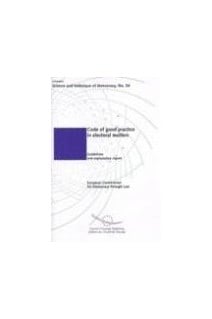Democracy cannot be imagined without elections which respect the principles of European electoral heritage. The code of good practice in electoral matters defines these rules: universal, equal, free, secret and direct suffrage, as well as the frequency of election. It also develops the conditions necessary for their implementation, for example respect for fundamental rights, the stability of electoral law and procedural guarantees, such as the organisation of elections by an impartial body and the existence of an efficient system of appeals and observation. This text is a guide to promote the harmonisation of electoral norms and to serve as a reference for evaluating elections.It is directed at electoral specialists ( members of electoral commission, university lecturers) as well as observers, policians and, more generally, all citizens who are electors.
Contents
Introduction
GUIDELINES ON ELECTIONS adopted by the Venise Commission at its 51st Plenary Session (Venise, 5-6 July 2002)
EXPLANATORY REPORT adopted by the Venise Commission at its 52nd Plenary Session (Venice, 18-19 October 2002)
General remarks
I. The underlying principles of Europe's electoral heritage
Introduction: the principles and their legal basis
1/ Universal suffrage
2/ Equal suffrage
3/ Free suffrage
4/ secret suffrage
5/ Direct suffrage
6/ Frequency of elections
II. Conditions for implementing the principles
1/ Respect for fundamental rights
2/ Regulatory levels and stability of electoral law
3/ Procedural safeguards
Conclusion




